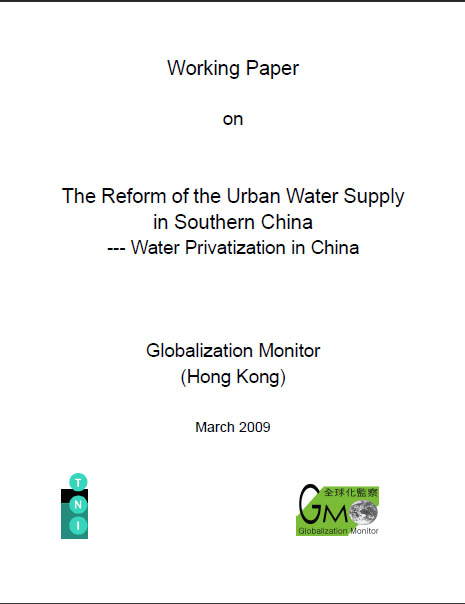
Introduction
“I think it’s unfair to criticize the Chinese government for supporting water privatization. There are many rationales behind the introduction of private capital. The government is facing a lot of problems, such as poor water quality, lack of tap water in remote areas and wastewater problems, because there’s limited capital and financial support for the building of infrastructure. That’s why we need to involve private companies. Once they bring money to the water supply sector, many problems can be solved. Besides, the management of private firms will definitely be better than the bureaucratic state-owned-enterprises. If a private firm can run the water supply service in a better way, why should we be against it?”
--- This is the opinion expressed by a middle-aged Hong Kong man in a well-educated manner during the Human Rights Day Carnival 2008 in Hong Kong. Many people who support China’s water privatization movements share this man’s views and logic.
Problems associated with China’s urban water supply before its reform included water shortages, aggravation of water pollution, capital shortage, poor management, poor coverage, and low efficiency of water usage. The Chinese government, together with the support of international agencies such as the World Bank and the Asian Development Bank (ADB), assumes that the privatization of water will solve these problems. In late 2002, the Chinese government expressed her full-fledged commitment to private involvement in water management by issuing a document encouraging local authorities to open their water market to private capital and foreign investments.
During the following period, we can observe many major movements in the water industry, such as large-scale contracts obtained by transnational water giants like Suez and Veolia, and the rise of local water corporations such as the Beijing Capital Group and Shenzhen Water Group. It seems, that the water supply in urban China has transformed into a more ‘advanced’ and ‘modern’ industry, with the supportive posture of the government, the blossoming water-related businesses, and the grand achievements stated by the water corporations. However, in the process of reformation, what we have seen is not only the transfer of operating rights or infrastructure from state-owned-enterprises (SOE) to for-profit private companies, we also have observed that water is 4 increasingly being managed according to commercial criteria, which demonstrates the government’s fundamental conceptual change regarding water --- from a common good to a trading commodity. It leads us to ask: Who has the control over precious water resources and services? How can we ensure an equitable, as well as a sustainable water use?
Furthermore, after the beginning of market reform, what are the pictures of water management in urban China now? Does the reform really improve what the government expects private sectors to improve, such as better service quality? From the conversations we have had with the citizens in south China, there are three issues that concern the general public most: water quality, water tariffs and water provision. We have found that many citizens are unhappy with the water quality; many have complained that the “Water price has been increased in the past years, but the water quality does not improve accordingly.” Some even say, “I cannot see what kind of services the company has provided to us.” There is nothing they can do to improve the situation though; “There is no way for us to express our opinions,” “What can we do? We still have to eat even if the quality is not good.” It seems that private water companies do not keep their promises of providing a better service to our people, but only focus on how to expand their businesses. This leads us to ask further questions: What are the roles of the government in water supply? And what are the roles and places of people?
